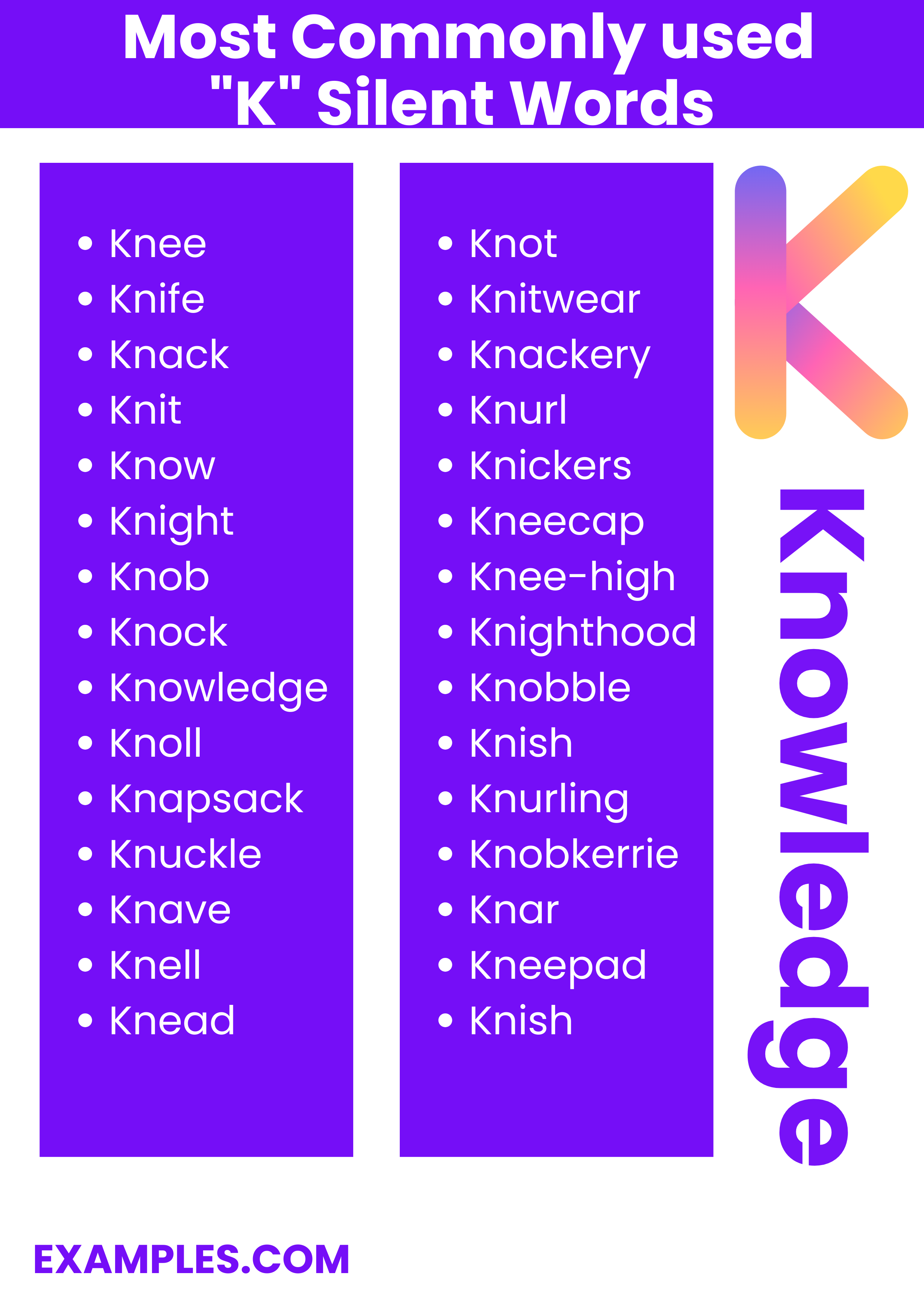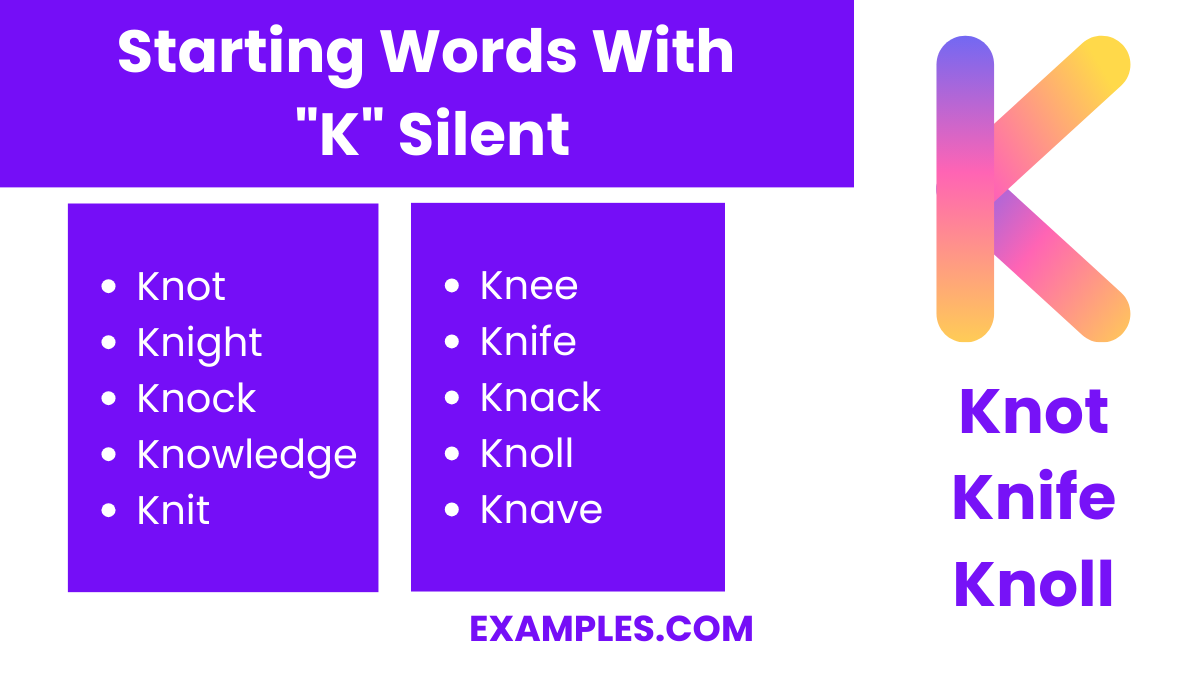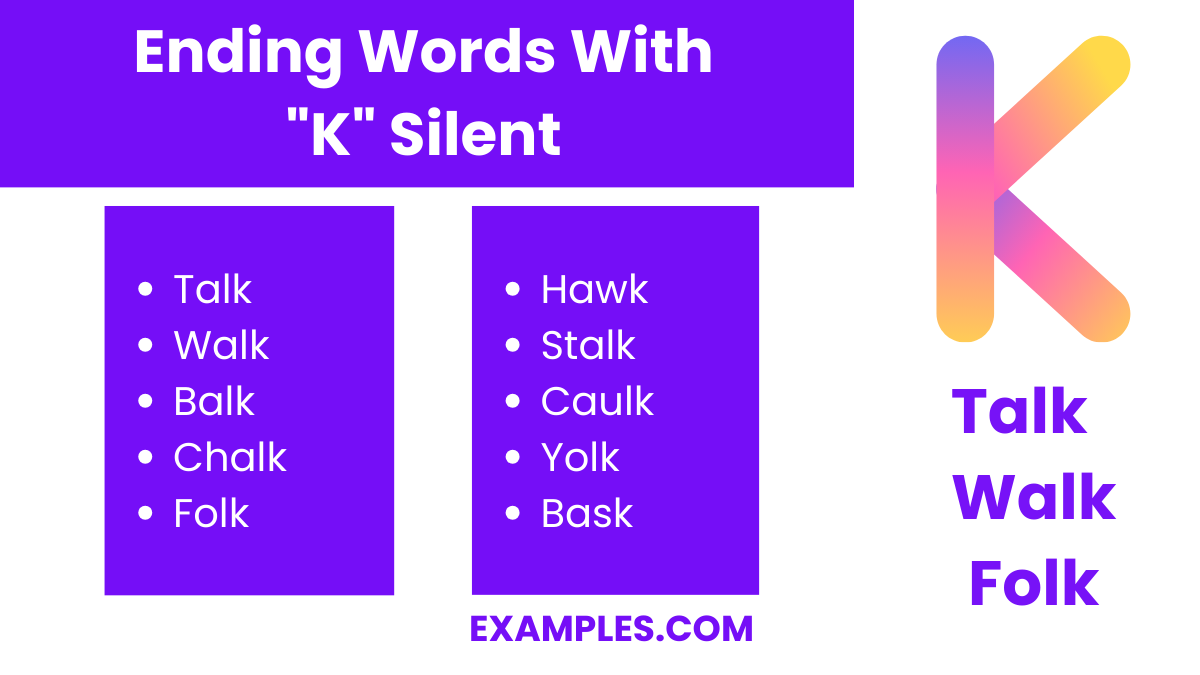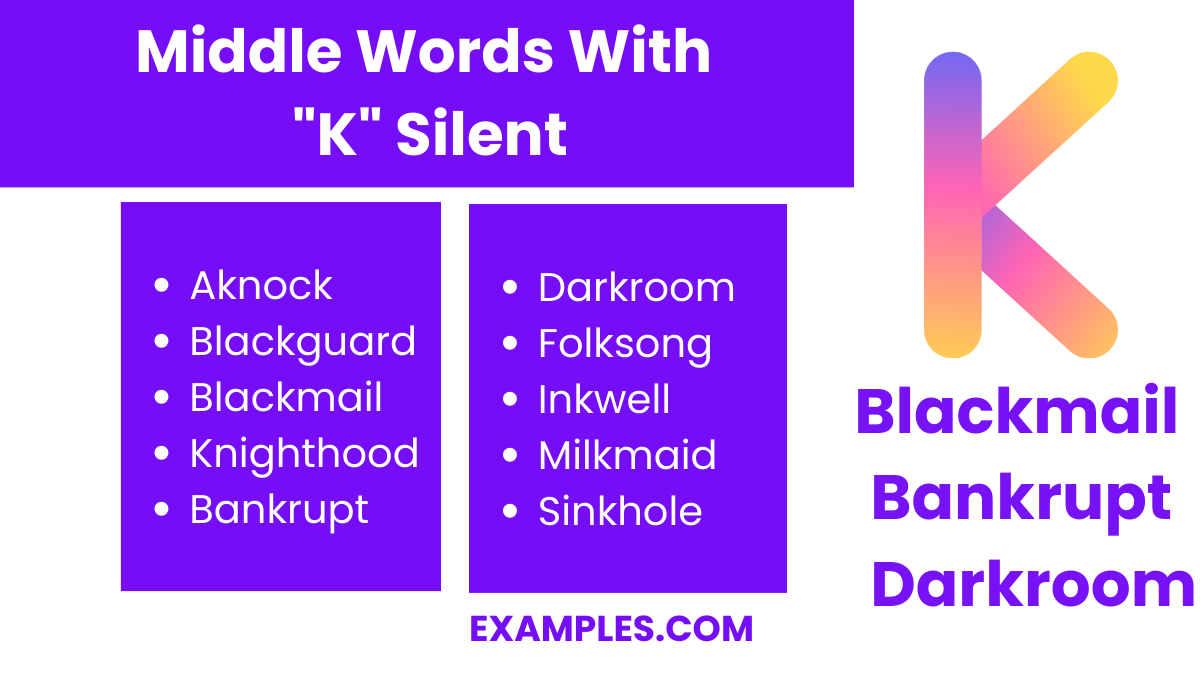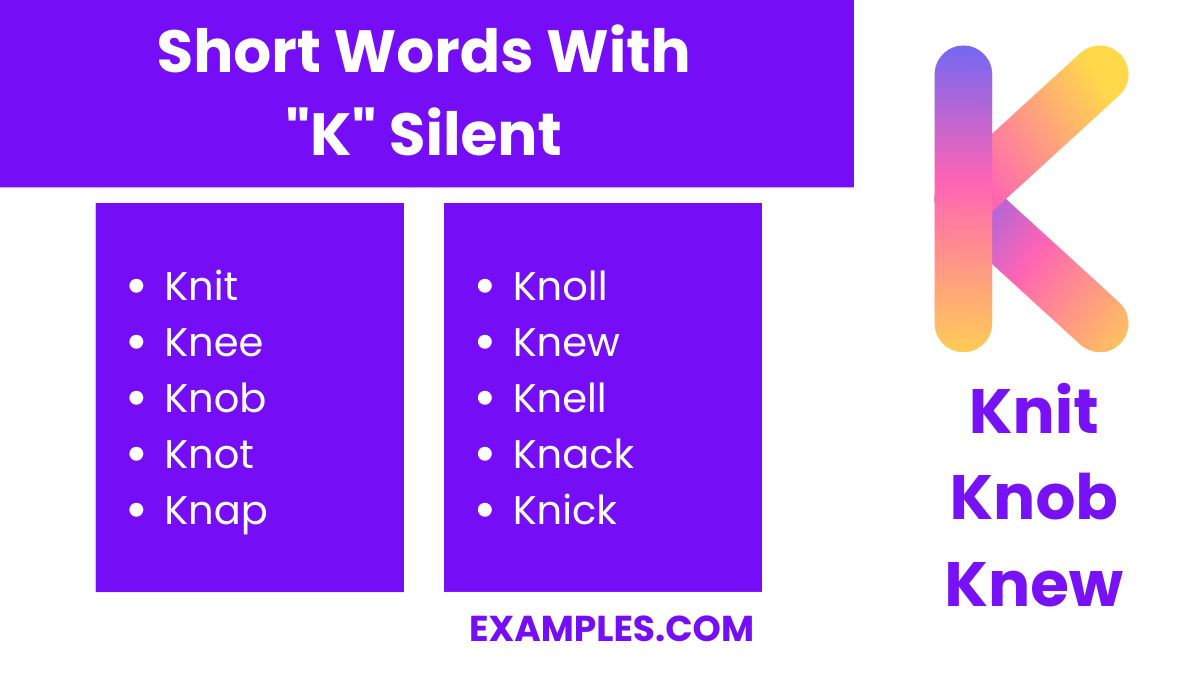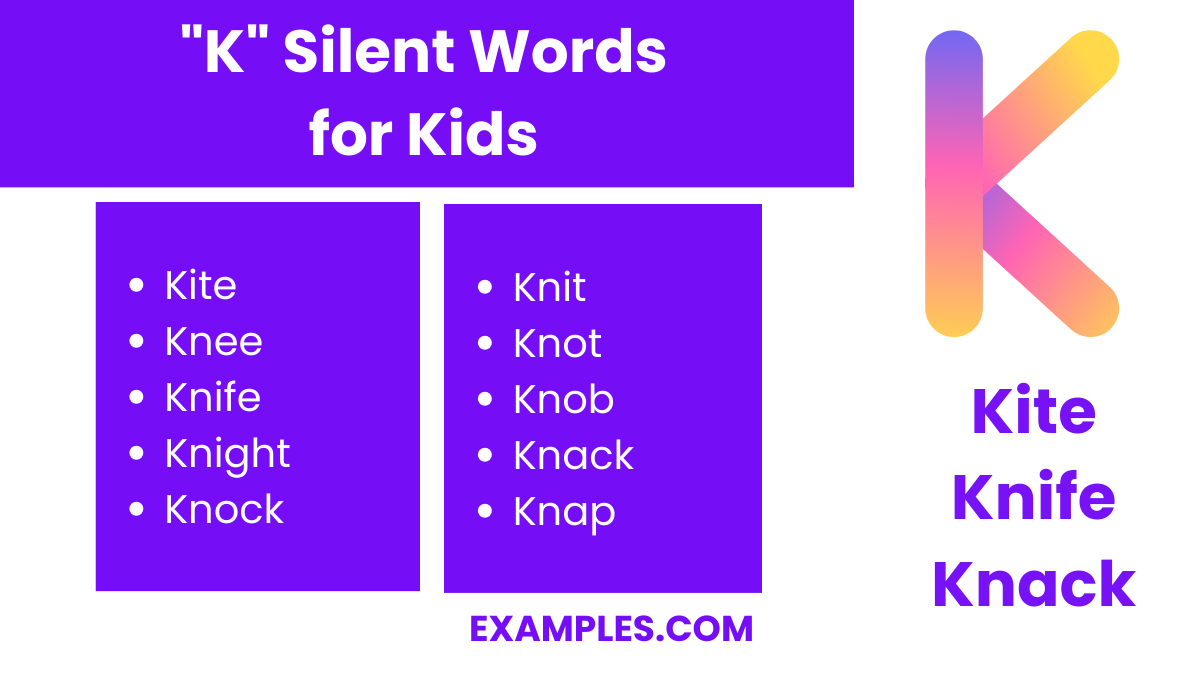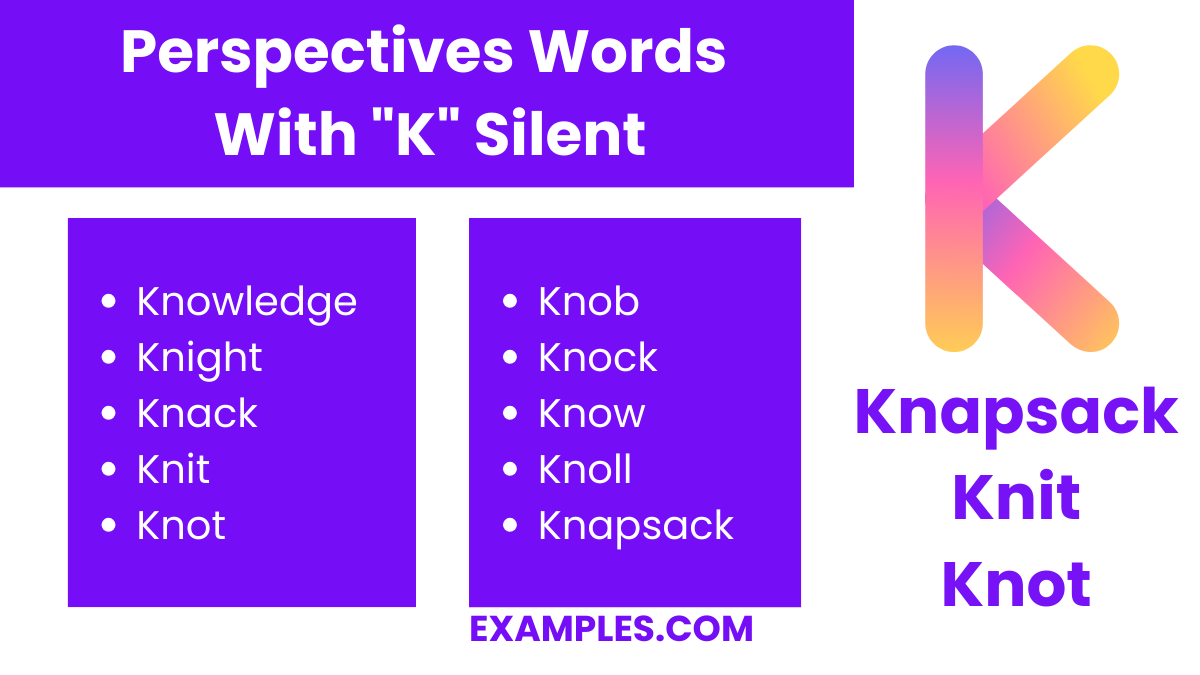450+ K Silent Words List, Meaning, PDF
The silent “K” in English is a fascinating quirk, often found lurking at the beginning of words, invisible in sound but impactful in spelling. This enigmatic letter traces its silent role back to Old English and Norse origins, where it once voiced its presence. Understanding these words not only enriches one’s vocabulary but also unveils the layered history of English. From knowledgeable knights to the knotty knots in your shoelaces, silent “K” words add a touch of mystery and sophistication to the language.
Download Most Commonly Used K Silent Words - PDF
30 Most Commonly used “K” Silent Words
Delving into the silent “K” in Daily Use English words opens a fascinating phonetic chapter, where the ‘K’ remains unseen in pronunciation, adding a layer of complexity and elegance to the language. This characteristic is a nod to the language’s historical depth and its ability to absorb and adapt linguistic elements from various sources. Mastering these words can significantly enhance one’s pronunciation skills and deepen appreciation for the intricacies of English. Below is an extensive list of commonly used words with a silent ‘K’, complete with phonetic transcriptions, to aid in their pronunciation and integration into your vocabulary.
| Knee | [niː] | Knife | [naɪf] | Knack | [næk] |
| Knit | [nɪt] | Know | [nəʊ] | Knight | [naɪt] |
| Knob | [nɒb] | Knock | [nɒk] | Knowledge | [ˈnɒlɪdʒ] |
| Knoll | [nəʊl] | Knapsack | [ˈnæpsæk] | Knuckle | [ˈnʌk(ə)l] |
| Knave | [neɪv] | Knell | [nel] | Knead | [niːd] |
| Knot | [nɒt] | Knitwear | [ˈnɪtwɛə] | Knackery | [ˈnakəri] |
| Knurl | [nɜːl] | Knickers | [ˈnɪkəz] | Kneecap | [ˈniːkæp] |
| Knee-high | [ˌniː ˈhaɪ] | Knighthood | [ˈnaɪthʊd] | Knobble | [ˈnɒb(ə)l] |
| Knish | [kˈnɪʃ] | Knurling | [ˈnɜːlɪŋ] | Knobkerrie | [nɒbˈkɛri] |
| Knar | [nɑːr] | Kneepad | [ˈniːpæd] | Knish | [kˈnɪʃ] |
Starting Words With “K” Silent
The silent “K” at the start of words often surprises English learners, adding a unique twist to pronunciation. These words, with roots in Old English, Germanic, and Norse languages, highlight the rich tapestry of the English language’s evolution. Teachers can use examples of both singular and plural words featuring this silent “K” to deepen students’ understanding of phonetic rules and etymology, making learning both engaging and insightful. Here are ten examples where the “K” is seen but not heard, introducing a layer of complexity to English pronunciation and illustrating the language’s diverse influences.
- Knot (not) – A fastening made by tying a piece of string, rope, or something similar.
- Knight (nait) – A man awarded a nonhereditary title by a monarch or other political leader for service to the monarch or country.
- Knock (nok) – To rap on a door or surface to attract attention.
- Knowledge (nol-ij) – Facts, information, and skills acquired through experience or education.
- Knit (nit) – To make (a garment or fabric) by interlocking loops of wool or other yarn with knitting needles or on a machine.
- Knee (nee) – The joint between the thigh and the lower leg in humans.
- Knife (nife) – An instrument composed of a blade fixed into a handle, used for cutting or as a weapon.
- Knack (nak) – An acquired or natural skill at performing a task.
- Knoll (nol) – A small hill or mound.
- Knave (nayv) – A dishonest or unscrupulous man.
Ending Words With “K” Silent
Words ending with a silent “K”, less common in English, often hail from specific dialects or archaic forms of the language. They underscore English’s capacity to absorb and adapt elements from a myriad of sources over centuries. By integrating these examples, especially compound words, into lessons, educators can help students appreciate the diversity within English spelling and pronunciation. This approach transforms language learning into a more intriguing and exploratory process, encouraging a deeper exploration of the language’s rich heritage and its dynamic, evolving nature.
- Talk (tawk) – To speak in order to give information or express ideas or feelings.
- Walk (wawk) – To move at a regular pace by lifting and setting down each foot in turn.
- Balk (bawk) – To hesitate or be unwilling to accept an idea or undertaking.
- Chalk (chawk) – A soft white limestone used for writing on blackboards or in art.
- Folk (fohk) – People in general, or people related to a particular group or country.
- Hawk (hawk) – A bird of prey with broad rounded wings and a long tail, typically taking prey by surprise with a short chase.
- Stalk (stawk) – The main stem of a plant, or the act of pursuing or approaching prey stealthily.
- Caulk (kawk) – A waterproof filler and sealant used in building and repair to make watertight.
- Yolk (yohk) – The yellow internal part of a bird’s egg, which is rich in protein and fat.
- Bask (bask) – To revel in and make the most of (something pleasing).
Middle Words With “K” Silent
In English, discovering words with a silent “K” in the middle is an intriguing rarity, predominantly found in compound or encouraging words of foreign derivation. These linguistic curiosities emphasize the eccentric aspects of English spelling and pronunciation, offering learners an exceptional chance to delve into the language’s intricacies and historical layers. The exploration of these encouraging words not only enriches vocabulary but also fosters a deeper appreciation for the nuanced and dynamic nature of English, encouraging a more profound engagement with the language.
- Aknock (uh-nok) – Startled or taken by surprise.
- Blackguard (blag-erd) – A person, particularly a man, who behaves dishonorably or contemptibly.
- Blackmail (blak-mayl) – The act of demanding payment or another benefit from someone in return for not revealing compromising information about them.
- Knighthood – The title, rank, or status of a knight.
- Bankrupt (bangk-ruhpt) – Unable to pay outstanding debts.
- Darkroom (dahrk-room) – A room for developing photographic films.
- Folksong (fohk-song) – A song that originates in traditional popular culture or that is written in such a style.
- Inkwell (ink-wel) – A small container for ink.
- Milkmaid (milk-meyd) – A girl or woman who milks cows or is employed in the dairy industry.
- Sinkhole (sink-hohl) – A cavity in the ground, especially in limestone bedrock, caused by water erosion.
Long Words With “K” Silent
Delving into the realm of silent “K” words, long describing words present a fascinating amalgamation of linguistic heritage and phonetic curiosity. These terms, often sprouting from ancient or foreign roots, have woven themselves into the fabric of English, retaining their original spellings while adopting a new, silent persona for the “K”. Such words are a treasure trove for educators, offering students opportunities not only for vocabulary expansion but also for exploring linguistic history and the evolutionary dynamics of language. Here are ten long words where the “K” whispers silently, defying conventional pronunciation norms and enriching the descriptive vocabulary of English.
- Knighthood (nait-hood) – The rank or title of a knight.
- Knowledgeable (nol-ij-uh-buhl) – Possessing or exhibiting knowledge, insight, or understanding.
- Knucklebone (nuk-uhl-bohn) – A bone of a joint of the finger, especially one of the articulations of a metacarpal with a phalanx.
- Knockwurst (nok-wurst) – A short thick highly seasoned sausage.
- Knightliness (nait-li-ness) – The qualities characteristic of a knight, such as bravery, courtesy, honor, and gallantry toward women.
- Knapsack (nap-sak) – A bag with shoulder straps, carried on the back, and typically made of canvas or other weatherproof material.
- Knobkerrie (nob-ker-ee) – A short wooden club with a heavy knob on one end, used as a weapon in Southern Africa.
- Knickerbockers (nik-er-bok-ers) – Loose-fitting trousers gathered at the knee or calf.
- Knowledgeability (nol-ij-uh-bil-i-tee) – The state of being knowledgeable.
- Knackwurst (nak-wurst) – Another term for knockwurst, emphasizing the silent “K”.
Short Words With “K” Silent
Short words with a silent “K” offer a fascinating glimpse into the quirks of English pronunciation, where brevity meets complexity. These words are ideal for introductory lessons on silent letters, providing a simple yet intriguing challenge for learners. Here are ten short words that embody the silent “K” phenomenon, perfect for expanding young vocabulary with a touch of linguistic intrigue.
- Knit (nit) – To make fabric by interlocking loops of yarn with needles.
- Knee (nee) – The joint between the thigh and the lower leg.
- Knob (nob) – A rounded handle or control on a door, drawer, or machine.
- Knot (not) – A fastening made by looping and tying a piece of rope, string, etc.
- Knap (nap) – To break off a small, sharp piece of rock or glass.
- Knoll (nol) – A small hill or mound.
- Knew (noo) – Past tense of know; to have been aware.
- Knell (nel) – The sound of a bell, especially when rung solemnly for a death or funeral.
- Knack (nak) – A skill or ability to do something easily and well.
- Knick (nik) – A small cut or notch.
“K” Silent Words for Kids
Introducing silent “K” words to kids unveils the playful side of English, revealing a realm where sounds and letters don’t always align. These words, pivotal for enriching vocabulary, also offer a delightful avenue to grasp the whimsical aspects of spelling and pronunciation. Here’s a curated list of child-friendly silent “K” words that not only educate but also entertain, perfect for igniting curiosity in the language’s complexities. Among these, rhyming words with silent “K”s can particularly captivate young learners, turning language exploration into an engaging and joyful experience.
- Kite (kait) – A light frame covered with paper, cloth, or plastic, flown in the air at the end of a long string.
- Knee (nee) – The joint between the thigh and the lower part of the leg.
- Knife (naif) – A utensil or tool used for cutting, typically with a metal blade and a handle.
- Knight (nait) – In historical contexts, a man who served his sovereign or lord as a mounted soldier in armor.
- Knock (nok) – To rap on a door or surface to attract attention.
- Knit (nit) – To make (a garment or piece of fabric) by interlocking loops of wool or other yarn with knitting needles or on a machine.
- Knot (not) – A fastening made by looping and tying a piece of string, rope, or something similar.
- Knob (nob) – A rounded handle, or a small, rounded control on a machine or door.
- Knack (nak) – A special skill, talent, or aptitude.
- Knap (nap) – To break off a small, sharp piece of something, typically with a sharp blow.
Perspectives Words With “K” Silent
Dive into the silent world of ‘K’ with this insightful collection, where the ‘K’ whispers its presence but is never fully heard. These words, steeped in history and etymology, weave a rich tapestry of language that beckons both learners and educators to explore the silent nuances of English pronunciation. Integrating these examples, especially praising words with silent ‘K’s, into the curriculum can significantly enhance students’ phonetic awareness, broaden their vocabulary, and deepen their understanding of language structure. This approach makes learning not only engaging but also comprehensive, celebrating the intricacies of English with a focus on its encouraging aspects.
- Knowledge [ˈnɒlɪdʒ] – Facts, information, and skills acquired through experience or education.
- Knight [naɪt] – A man awarded a nonhereditary title by a monarch in recognition of merit or service.
- Knack [næk] – An acquired or natural skill at performing a task.
- Knit [nɪt] – To make (a garment, blanket, etc.) by interlocking loops of wool or other yarn with knitting needles.
- Knot [nɒt] – A fastening made by tying a piece of string, rope, or something similar.
- Knob [nɒb] – A rounded lump or ball, especially at the end or on the surface of something.
- Knock [nɒk] – To strike a surface noisily to attract attention, especially when waiting to be let in through a door.
- Know [nəʊ] – To be aware of through observation, inquiry, or information.
- Knoll [nəʊl] – A small hill or mound.
- Knapsack [ˈnæpsæk] – A bag with shoulder straps, carried on the back, and typically made of canvas or other weatherproof material.
In conclusion, exploring words with a silent “K” unveils the subtleties and depth of English phonetics, enriching both vocabulary and pronunciation skills. This linguistic journey not only highlights the silent power of ‘K’ but also deepens appreciation for the language’s complexity. Embrace these silent letters as keys to unlocking a more nuanced and articulate command of English, essential for effective communication and understanding.



